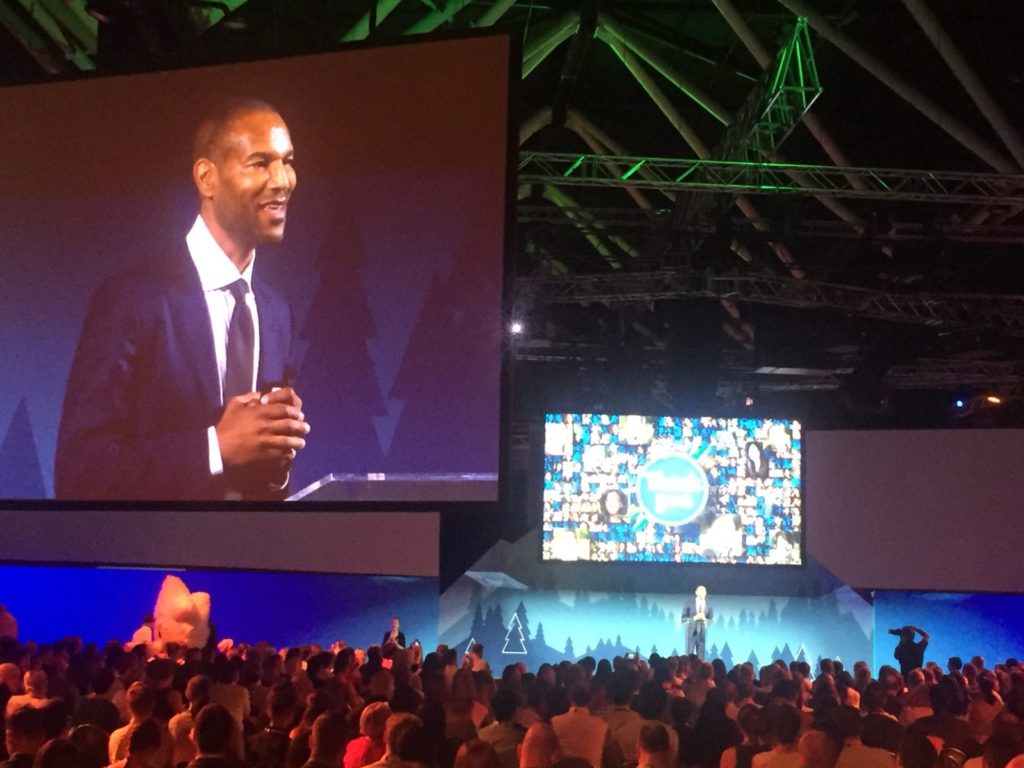We saw this in Australia over the weekend when twenty CEOs signed a letter to the Turnbull Government urging it to move forward on marriage equality. We also saw it in the United States recently, as some of the world’s largest organisations took a stand against President Donald Trump’s original executive order suspending entry to the United States to citizens from seven countries.
We’re also seeing it in the fact businesses need to step up on such issues, or face the consequences – such as a loss of customers, and an inability to attain and retain the best possible talent.
On Tuesday the Salesforce World Tour event in Sydney, attracting around 11,000 registrations, made a point on including sessions on diversity and equality.
Indeed, its final keynote session of the day featured Human Rights Commissioner Professor Gillian Triggs and lawyer Deng Thiak Adut, in a session moderated by the company’s Chief Equality Officer, Tony Prophet (pictured above).
Yes, Salesforce has a Chief Equality Officer. He was appointed in October 2016, and oversees the company’s equality initiatives, reporting direct to CEO Marc Benioff. At the time of his appointment, Prophet told Fortune magazine that including the word ‘equality’ rather than ‘diversity’ in his title was “very deliberate” and was designed to show that his responsibilities extend far beyond simply diversifying the company’s workforce – where there is still work to do.
Prophet told the Sydney audience yesterday that Salesforce has four key pillars to addressing its value of equality: equal rights, equal pay, equal education and equal opportunity. In 2015 Salesforce undertook a company wide pay audit, and spent $3 million making salary adjustments.
Visiting Sydney from the United States, Prophet said that in trying to understand equality in Australia, he’d come to appreciate three words we particularly love to use: “A fair go”.
Professor Gillian Triggs told the audience – a mix of men and women – that we all have the opportunity to help make equality a reality, particular at work.
“You are the influential leaders, you have the opportunity to deliver tangible equality for some of the most vulnerable people in Australia,” she said.
She also went on to highlight a number of examples of businesses taking a stand, and also taking responsibilities for their actions and mistakes – as Australian company Rip Curl recently did, in issuing a statement that “We take full responsibility”, when reports emerged that it’s ski gear was being produced in a North Korean factory.
She said the key things Australians are interested in are fair, equal employment and access to delivery and services – especially for women. These are things employers can aim to address.
“Diversity and equality are good for business,” she said. “But without leadership, we lose the imperative and the guidance within our communities.’
Referring to the 20 CEOs who signed on to make a point about marriage equality, she said it’s an excellent example of the leadership that’s needed. “We need more leaders with that kind of courage.”
Following Triggs’ speech, Deng Adut shared his personal story as a former child soldier in South Sudan who escaped to Kenya at just 12 and later moved to Australia as a teenager. He urged all of us to give each other a “fair go” .
Tuesday’s keynote session called ‘Australia in the Age of Equality’ was standing room only at the International Convention Centre. This wasn’t a women’s event, but a tech event. It also occurred almost to the minute that our Parliament was debating adjusting the wording of Section 18c of the Racial Discrimination Act in the interests of “free speech”. The age of equality is available now, but we can’t expect politicians to fight for it. We can, as consumers, employees and employers do more to encourage equality, and thrive with the opportunities that come with it.
Pictured above: Tony Prophet, Salesforce Chief Equality Officer.

